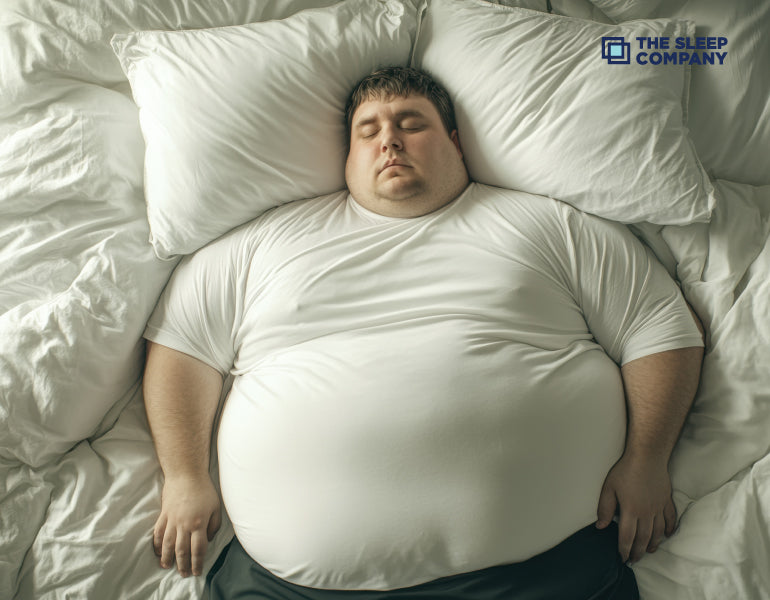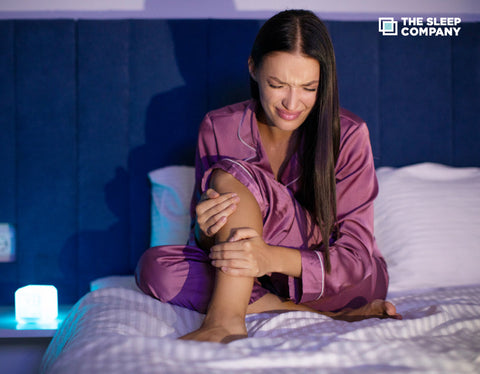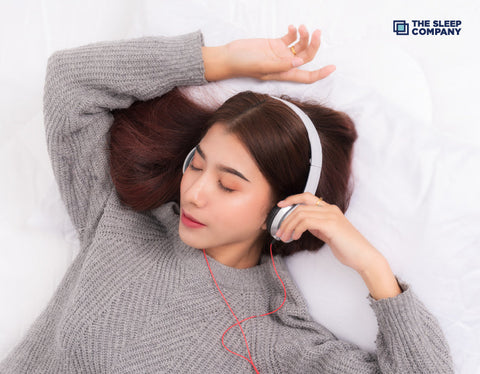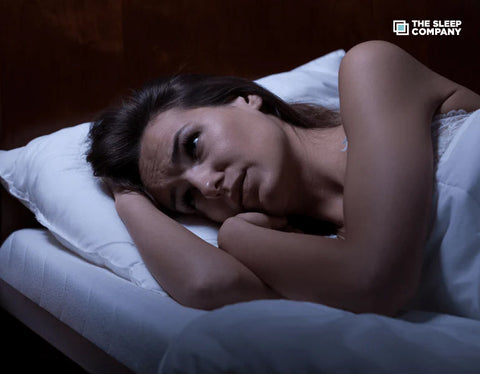My Cart

Common Causes of Sleep Apnea: From Obesity to Genetic Factors

You must have stumbled upon the term sleep apnea when discussing sleep disorders. Today, almost 104 million Indians battle this condition. And, it is actually a major health problem.

But what is sleep apnea? What are the symptoms and causes?
Well, in today's article, we equip you with all the information you need. So, without further ado, let's get started.
What Is Sleep Apnea?
Sleep apnea is a sleep disorder where your breathing repeatedly stops and starts during your slumber. This disrupts normal breathing patterns and results in poor-quality sleep.
There are two types of sleep apnea:
-
Obstructive Sleep Apnea
This is the most common type of sleep apnea. Here, sleep breathing problems are due to airway blockage. As you snooze, your throat muscles tend to relax, which leads to partial or complete airflow interruption.
-
Central Sleep Apnea
Central sleep apnea can occur when the brain fails to send proper signals to muscles controlling breathing. Unlike with Obstructive Sleep Apnea, there is no physical airway blockage. It is often linked to neurological conditions, heart problems, or medication use.
Symptoms of Sleep Apnea
Here are the signs of sleep apnea:
1. Symptoms of Obstructive Sleep Apnea

- Loud snoring
- Waking up suddenly gasping or choking
- Daytime fatigue
- Dry mouth or sore throat
- Restless sleep with frequent tossing and turning
2. Symptoms of Central Sleep Apnea

- Breathing pauses without any snoring
- Waking up frequently due to a sense of breathlessness
- Difficulty concentrating because of lack of sleep
- Daytime fatigue
- Increased irritability or depression
Causes of Sleep Apnea
Now without any delay, let’s unpack all the main causes of sleep apnea.

1. Obesity
One of the main obstructive sleep apnea causes is obesity. This is because the fats tend to deposit around the neck and throat. So, the airways become narrow and may lead to breathing difficulties. Obesity can also reduce lung capacity, which further aggravates breathing.
2. Anatomical Factors
Sometimes, we are born with certain anatomical features like a narrow airway or large tonsils, which can be the reasons for sleep apnea. Certain features make the airway more prone to collapse during sleep.
3. Age and Gender
Sleep apnea is more common in men than women. Also, the sleep disorder's risk tends to increase with age.
4. Family History or Genetics
If you have a family history of sleep apnea, you may be at risk as well. When you identify familial risk, it can encourage earlier screening and lifestyle changes to prevent complications.
5. Smoking
When smoking becomes a habit, it can irritate and inflame the airways. So, it becomes more susceptible to obstruction. This is actually one of the main causes of sleep apnea. It also increases mucus production and fluid retention in the upper respiratory tract, which exacerbates sleep apnea.
6. Alcohol or Sedatives
Consuming alcohol or sedatives can relax the throat muscles a little too much. Therefore, it puts you at risk of airway collapse during sleep. They also suppress the brain’s ability to detect and correct breathing interruptions.
7. Nasal Congestion and Allergies
One of the causes of sleep apnea is nasal congestion or allergies. This is because it can restrict airflow through the nasal passage and you are forced to breathe through the mouth. And, this can lead to airway collapse.
8. Chronic Conditions
Chronic conditions like high blood pressure and diabetes are linked to sleep apnea. This is because they can aggravate nerve function and blood flow, which can cause breathing irregularities.
9. Hormonal Imbalances
Hormonal conditions like hypothyroidism or polycystic ovary syndrome (PCOS) can increase sleep apnea risk. This is because they can affect your weight and breathing control.
10. Sleep Position
Sleeping on the back increases sleep apnea risk because gravity can push the tongue and soft palate backward. This can block the airways.
How Does Sleep Apnea Affect the Body?
As you already know, sleep apnea can lead to breathing disruptions, which can hamper your sleep. On one hand, it strains the heart, which can put you at risk of high blood pressure and other chronic conditions. And, on the other, a lack of quality sleep leads to daytime fatigue and makes it difficult for you to concentrate.
When sleepless nights become a regular issue, it can weaken the immune system and negatively affect the metabolism. Chronic oxygen deprivation caused by sleep apnea can impact brain health as well. That's why sleep apnea needs immediate medical intervention.
How to Treat Sleep Apnea?
Here are a few ways in which you can easily treat sleep apnea:

-
Sleep Position
You know what the cause of sleep apnea is. One of them is sleeping on your back. Therefore, try sleeping on your side. Use a pillow to support you if necessary. Also, keep your head elevated. This simple trick can reduce the frequency and intensity of sleep apnea.
-
Medication
Medicines may not be prescribed directly for sleep apnea but for conditions that act as a contributing factor. This can be for allergies or nasal congestion. However, depending on your condition, your doctor will be able to steer you in the right direction.
-
Changes in Lifestyle
Sometimes, small changes in lifestyle can have a big impact. Quitting smoking or reducing alcohol consumption can improve your overall health and reduce the frequency of sleep apnea because it prevents excessive throat muscle relaxation.
-
Medical Treatment
When it comes to medical treatments for sleep apnea, Continuous Positive Airway Pressure (CPAP) therapy is the gold standard. CPAP delivers a steady airflow to keep airways open during sleep. Other options, like bi-level positive airway pressure (BiPAP) or adaptive servo-ventilation, help with more complex cases like central sleep apnea.
-
Oral Devices
You also have custom-fitted oral appliances that can reposition the jaw or tongue to prevent airway collapse during sleep. You can talk to your doctor for more information.
-
Surgery
Surgery is also an option in treating sleep apnea. However, it is only for severe cases when all other treatment options fail. Surgery can address structural causes and offer a permanent solution.
Conclusion
If you have been experiencing signs of sleep apnea, it is imperative that you speak with your doctor right away. Medical intervention will steer you in the right direction and offer the treatment that's suitable for your condition.
Also, sleep position plays a major role in sleep apnea. Keeping your head elevated as you snooze can be extremely beneficial. That's why The Sleep Company brings you an Elev8 Smart Recliner Bed that can assist your sleep apnea management techniques.
Our adjustable Smart Recliner Bed helps you choose your perfect head elevation with a click of a button and offers a variety of other features like the NASA-approved Zero Gravity position.
Choose The Sleep Company today and see the difference in your sleep experience right away.
FAQs
Sleep apnea is a condition where your breathing repeatedly stops during your sleep. The main causes of sleep apnea are obesity, enlarged tonsils, and a narrow airway. When it comes to central sleep apnea, brain signal disruptions are the reason.
Obesity puts you at a risk of developing fat deposits around the neck and throat. This can disrupt the airflow as you snooze. Also, the abdominal fat impacts lung function and reduces airflow capacity.
Certain anatomical features, such as a recessed jaw, enlarged tonsils, thick neck circumference, or a deviated nasal septum, increase the likelihood of sleep apnea. These features can narrow or obstruct the airway.
Yes, sleep apnea is more common in men than women. This is because testosterone can influence upper airway muscle and increase collapse risk.
Yes, sleep apnea occurs only when you are asleep because that’s when the throat muscles relax.





























































